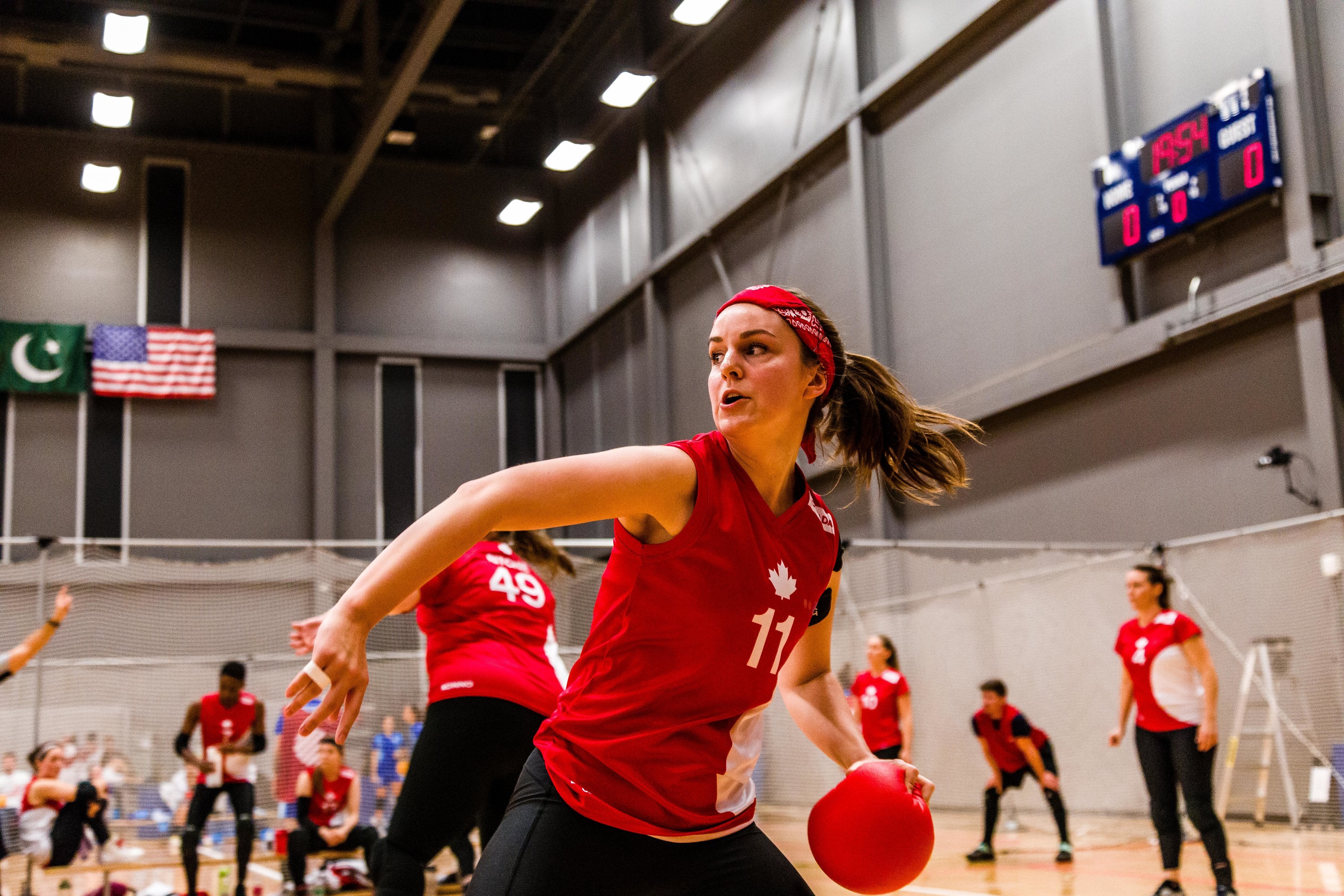In honor of National Girls and Women in Sports Day on Feb. 5, Savage is highlighting some of our favorite female athletes [like Ultimate player Jenny Fey, Spikeballer Tori Farlow, and disc golfer Hannah McBeth] in some of our favorite sports throughout the week. Next up: Dodgeball player Shauna Roe.
Shauna Roe has been playing dodgeball competitively for around 8 years, playing on the Canadian National Team for 6 years. When she's not hurling balls, the 28-year-old is a full-time advertising copywriter living in Toronto, Canada. Take it away, Shauna!
Savage: How did you get into playing dodgeball? What drew you to the sport?
Shauna Roe: My first experience with dodgeball, as with most people, started in elementary and high school. In college, I was asked to play on the extramural dodgeball team, who desperately needed girls that year. I actually said no at first! The idea of competitive dodgeball seemed outlandish to me, and I’d never really played a throwing sport before, so I figured there’d be no role for me. At my first practice, I realized there were in fact many roles to be played on the court, beyond knowing how to throw, including catching, calling plays, and drawing in balls.
What drew me to dodgeball was ultimately the persistence of Humber coach, Victor Gravili, who is now the coach of the national program and a good friend of mine.
Savage: What's unique about being a woman in the world of dodgeball?
SR: The power of underestimation. I love dodgeball because the game can change in an instant. A catch can bring a 4v2 to a 3v3. Sometimes you’ll see a single player eliminate five opponents to win the game. You really never know what could happen.
A lot of these moments I see happen with women. In co-ed, we’re often underestimated. A team will leave a female player for last, only to have her make a huge catch. Or a woman you’ve never seen before turns out to have a softball background and therefore has a canon for an arm.
Savage: How do you think being female in this sport compares to other sports?
SR: Dodgeball is very much still in its infancy as a sport. In my mind, this gives women an opportunity to define how women play it. I love this article’s POV on why men are, the vast majority of the time, better than women at sports. In short: Sports, especially those well-established, were designed by men, for men*. The rules, the court sizes, the skills involved, and so on. When women enter these sports, they’re playing an adjusted version of a “men’s game,” versus a game designed by women, for women.
As an increasing number of women have entered competitive dodgeball, I’ve personally noticed differences created between how men play and how women play. The strategies can be different. The play calls can be different. I would even argue the players valued most excel in different skills that are perhaps less valued in a men’s game.
All this to say, compared to other sports, women in dodgeball can influence the sport to work around them, not the other way around.
Savage: Are there any challenges to being a woman in dodgeball?
SR: I think the challenges women face in dodgeball are similar to all sports — less popularized, less viewership, a perceived slower or less intense game, to name a few.
Dodgeball is far from perfect in this regard, but I do see a lot being done to address the challenges, whether it’s putting the women’s final last on the schedule (often men’s is last as a ‘grand finale’), or ensuring an equal amount of men’s and women’s games appear on the live stream. I think little things like that go a long way.
Savage: Thoughts on bringing more women into dodgeball? Youth initiatives?
SR: Dodgeball Canada has YMCA youth nights for girls and boys that are run by volunteers and Team Canada players. They’ve also started a Dodge In Schools program, aimed to re-introduce dodgeball into schools as a sport that’s inclusive and skill-building.
After working on a project at work a few years ago relating to indigenous women, I developed a relationship with the Native Women’s Resource Centre in Toronto. Knowing the positive and empowering experience dodgeball has given me, I’ve always wanted to introduce an indigenous women’s team to our leagues, hoping it’s a similar experience for them.
Savage: What are your hopes for the future of the sport?
SR: I would love to see dodgeball move into a more legitimized space. I would love to see more high-performing athletes migrate to the sport (especially women). I would love to do an interview without the Ben Stiller movie being referenced. I would love to tell people I play dodgeball without having to follow with “yes, I’m serious.”
I believe dodgeball has the potential to be more universally viewed as a sport (not a game) that requires skill and athleticism, and comes with major entertainment value. Hello, TSN!
Savage: Who are some of your favorite female dodgeball players?
SR: There are many. But today, as I write this, these three come to mind:
- Hwei Xian, Team Malaysia — Because she never quits, has the quickness on court that I wish I had, and makes really smart decisions at important moments.
- Jiji Fayad, Team Australia —Because she’s really fun to watch, makes clutch plays all the time, and has a great amped-up face.
- Shadae Berkley, Team Canada — Because her work ethic inspires mine daily, she’s a caring teammate who’s always reminding me to keep my chin up, and most importantly, she drives me to practice (I owe her so much gas money, it’s nuts).
Psst: Shop the Women's Mystery Sale here.

